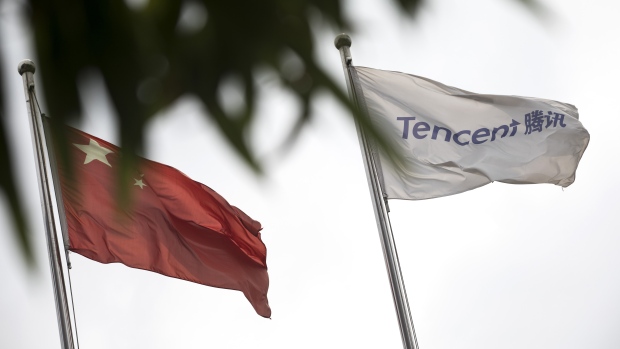Aug 28, 2018
Tencent selloff accounts for most of record Chinese sales of Hong Kong stocks
Bloomberg News

Chinese investors have dumped Hong Kong stocks at a record clip this month, as the city’s equity benchmark tumbled to its lowest in a year.
Mainland investors sold net HK$25.4 billion (US$3.2 billion) of Hong Kong equities in August through Tuesday, according to Bloomberg calculations based on daily turnover data. That’s the biggest monthly selling figure since China opened its first exchange link with the city in late 2014. Tencent Holdings Ltd. (TCEHY.PK) alone accounted for over half of the sales, as the Chinese technology giant reported its first profit drop in a decade.
Flows into Hong Kong stocks have waned as U.S.-China trade tension pulled investors away from riskier assets, while deleveraging measures squeezed liquidity and the yuan’s weakness hurt sentiment. Mainland investors became monthly net sellers from April through June, a record streak, before a small rebound in July. Then lacklustre results from heavyweights like Tencent and China Life Insurance Co. (LFC.N) darkened the mood again.
The Hang Seng Index hit its lowest in a year on Aug. 16 after Tencent posted its earnings and extended a five-day slump to 13 per cent. The Hong Kong benchmark added 0.2 per cent Wednesday, while Tencent dropped 1.3 per cent.
“Poor earnings served as a catalyst for outflows,” said Linus Yip, strategist with First Shanghai Securities Ltd. “The market was subject to profit-taking after gains last year and sentiment turned cautious in the past few months. Selling pressure got bigger with stock darlings like Tencent being brought down.”
EARNINGS SHOCKS
Mainland investors sold net HK$14.1 billion Tencent shares this month, according to Bloomberg calculations based on shareholding data from the local exchange, reducing their combined stake to about 1.3 per cent. That’s the smallest in about a year and compares with a 1.8-per-cent stake at the start of this year.
The Shenzhen-based company, which contributed to a quarter of the Hang Seng Index’s 36-per-cent gain last year, has lost US$133 billion in market value since its January peak amid concerns over slowing growth at its gaming unit and regulatory uncertainty. Business is likely to slow further as stricter gaming oversight may hurt high-margin games, said Shane Wu, fund manager at Yuanta Securities Investment Trust.
Hong Kong shares are still performing better than those on the mainland, but Chinese investors continue to offload a raft of big companies that missed estimates. They include China Life Insurance, which saw a HK$1.1 billion selloff through the stock connect this month, and Sunny Optical Technology Group Co. (SOTGY.PK), whose shares plunged by a record after first-half results. AAC Technologies Holdings Inc. (AACAY.PK) also missed by a wide margin.
“We’ve seen panic selling of technology shares in Hong Kong, as capital rushed to flee from the sector after weak earnings,” said Bruce Yu, a fund manager at Franklin Templeton SinoAm Securities Investment Management Inc. in Taiwan. “Market sentiment is very low in both Hong Kong and the mainland.”







